This project is made possible through the partnership of WATER CHARITY and the NATIONAL PEACE CORPS ASSOCIATION. ![]()
This project has been completed. Scroll down below to read the conclusion.
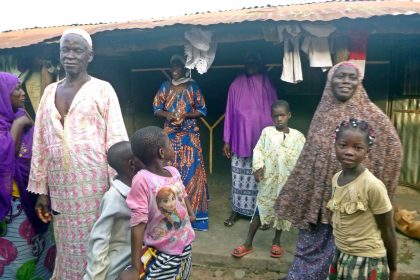 Location
Location
Wassarabo,Tchaoudjo Prefecture, Centrale Region, Togo
Community Description
Wassarabo village is located 25 kilometers northeast of Sokodé in the Tchaoudjo Prefecture. The population is around 1,100 and includes Tem, Kabyé, Losso, and Fulani ethic groups. The majority of people are Muslims with a minority of diverse Christian congregations. Most are subsistence farmers cultivating the region’s traditional crops; maize, yams, manioc, sorghum, soy (often transformed into “tofu” – an important market product for women), beans and some vegetable gardening. Overall enough staple crops are grown to allow most households some measure of food security. However, malnutrition is a problem amongst both adults and children as the diet is starch-based with little protein.
Fifty households have a shallow, open well within their respective compounds but water quality is poor and often insufficient to last throughout the dry season. Arab NGOs have installed three closed wells with hand pumps while the village has only one borehole well located outside the village, allegedly of poor water quality.
The Red Cross is an active participant in training community youth on hygienic food transformation and preparation, HIV and STD prevention. The Wassarabo health clinic is a 7-room, cement-block building constructed in 1978 by the Red Cross and provid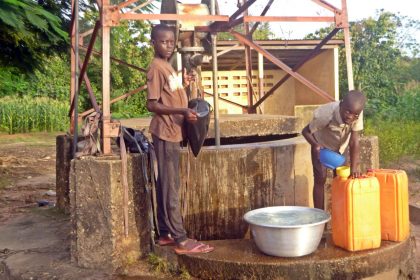 ed with an open, shallow well as the clinic’s sole water source. In 1987 the German government Aid Program closed the well, and installed the standard metal 4.5-meter-high water tower and polyethylene tank operated by a manual hand pump. The clinic is powered by electricity paid for by the Ministry of Health.
ed with an open, shallow well as the clinic’s sole water source. In 1987 the German government Aid Program closed the well, and installed the standard metal 4.5-meter-high water tower and polyethylene tank operated by a manual hand pump. The clinic is powered by electricity paid for by the Ministry of Health.
The clinic serves a larger population of around 3,000 people which includes many of the surrounding villages which are scattered at some distance from the health clinic. The health center has eight community health workers (i.e. community individuals trained to identify household-level health problems including childhood malnutrition, malaria detection, and prevention) who work in villages outside the 5-kilometer radius of Wassarabo. Clinic staff treats predominantly malaria, parasites, and gastrointestinal diseases. The clinic birth rate is unusually low – currently estimated at an average of 5/month. Women in the neighboring villages evidently prefer to attend the local community health “hut” which is not supported by the Ministry of Health. It is anticipated with the advent of potable running water inside the Wassarabo clinic, more women will seek pre- and post-maternal health care for themselves and their infants as childhood malnutrition is a serious problem.
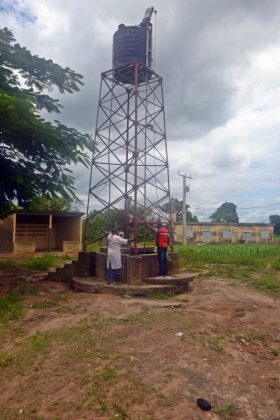 Problem Addressed
Problem Addressed
While indoor plumbing exists, the water tower/pump system has been inoperable since 1995 at which time the cement casing was broken to allow the clinic staff and the surrounding inhabitants to haul water manually. Water is currently accessed by bucket and rope, hence introducing more contaminants from the surrounding ground surface. The existing well is shallow, of poor water quality and is without water mid-dry season. Staff and patients are required to haul water in plastic jugs to the clinic. Water for consumption is treated with bleach. However, unsanitary well water is used directly for cleaning surfaces and bedclothes.
Project Description
This project is to build a borehole well for the clinic. Under the guidance of the Department of Hydraulics and Sanitation’s regional office in Sokodé and with support from the Ministry of Health regional director, who identified clinics with the most critical need, and a local drilling company, this project proposes to drill a 60- to 100-meter borehole well at the clinic, equipped with the following:
• an electric submersible pump
• a 4.5-meter high cement block water tower
• a 2 meter3 polyethylene tank
• piping to the main intake valve at the clinic
The submersible pump will be connected to the municipal electric power supply. The local drilling company selected, Plomberie Génerale de Réalisation de Forage, in operation since 1998 and based in Tchamba, has extensive experience drilling deep borehole wells throughout Togo and regionally in Burkina Faso, Benin and Nigeria.
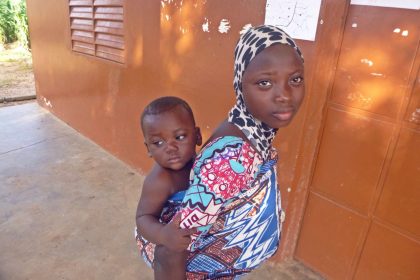 Project Impact
Project Impact
Number of people affected by the project: 3,000
Project Administration
This project will be managed by Anne Jeton, hydrologist and Returned Peace Corps Volunteer (RPCV), Burkina Faso (’82-’85) and Returned Peace Corps Response Volunteer (RPCRV), Togo (’16 -’17).
Anne was sent to Togo on behalf of Water Charity to develop and administer new projects, and to coordinate with Peace Corps.
Monitoring and Maintenance
Along with staff from the Department of Hydraulics and Sanitation who will monitor the well “indefinitely” (the well data becomes part of the official borehole well database, and as such is included in periodic field monitoring by technicians based in each Prefecture), the contract for well drilling states a one-year guarantee provided by the drilling company. Problems with pump and borehole functioning are typically resolved in the first month of use.
Proper screening of the borehole and submersible pump placement relative to the static water table often mitigate most common problems. However, any mechanical problems surfacing in the first year will be the responsibility of the drilling company.
The clinic staff will be responsible for maintaining a well repair account which will be funded from the sale of medicines. The clinic will decide a nominal fee for water use should the water account be insufficient, or the community will be asked to contribute directly to the costs.
Project Funding
This project has been funded by a donor who chooses to remain anonymous. If you would like to see more projects like this one in Togo, please Donate.
Conclusion of Wassarabo Clinic Borehole Water System Project – Togo
This project was managed by Anne Jeton, hydrologist and Returned Peace Corps Volunteer (RPCV), Burkina Faso (’82-’85) and Returned Peace Corps Response Volunteer (RPCRV), Togo (’16 -’17).
Project Name: Wassarabo Health Clinic Borehole Well Water System, Centrale Region, Togo
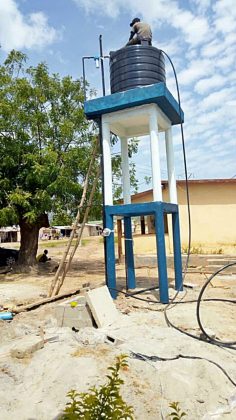 The purpose of the borehole water system project at the Wassarabo health clinic was to address a lack of both potable and year-round water, either the absence of or nonfunctioning indoor plumbing and the lack of a hygienic disposal of afterbirth blood and tissue.
The purpose of the borehole water system project at the Wassarabo health clinic was to address a lack of both potable and year-round water, either the absence of or nonfunctioning indoor plumbing and the lack of a hygienic disposal of afterbirth blood and tissue.
The maternity delivery room was equipped with a sink, faucet and running, potable water, and through additional outside funding; a floor drain and a discharge chamber, both plumbed to a dedicated subsurface cement-lined and ventilated septic tank. Delivery room waste (blood and tissue) can now be dispensed with directly in the maternity room in a safe and hygienic manner, rather than hand-carried by the midwives to an outdoor pit or in many cases poured into the latrines.
Following borehole drilling, a “pump test” was run to determine the well’s productivity and in turn the hydraulic properties of the aquifer. The pump was run for several hours at a rate like actual use and the declining water table (drawdown) was measured at regular intervals. The Wassarabo borehole was drilled to a depth of 100 meters and has a yield of 800 liters/hour which is more than adequate to supply both the clinic needs and those of the surrounding households. The pump test also indicated a rapid refilling of the borehole, implying even when run at the maximum yield rate, the well should recover quickly and not result in significant lag times. Simply put, the hydraulic conditions of the well are favorable to insure a sustainable water supply for many years to come (assuming the system is well maintained).
Water samples from both the borehole well and the original clinic well were taken and sent to the Regional laboratory in Sokodé, the regional capital, for a complete microbial and an inorganic compound analysis. The results of this analysis indicate zero presence of any of the disease-causing bacteria tested (E Coli, Salmonella, Fecal Streptococci, Enterococci and a general category of thermotolerant Coliforms) in the new borehole well.
Numerous visits were made during the well installation by the Water Charity Coordinator and the government hydrologist to oversee 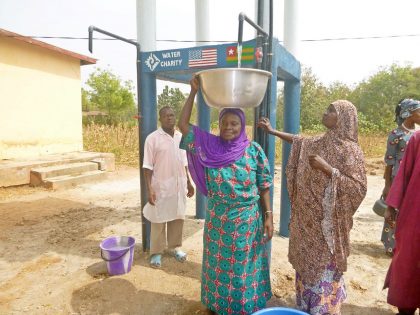 construction and to ensure the clinic and community leaders understood the responsibilities associated with maintaining and ensuring a sustainable water supply. A final visit by the Regional Director of hydraulics insured the borehole well and the associated delivery system met all the driller’s contract requirements and functionality.
construction and to ensure the clinic and community leaders understood the responsibilities associated with maintaining and ensuring a sustainable water supply. A final visit by the Regional Director of hydraulics insured the borehole well and the associated delivery system met all the driller’s contract requirements and functionality.
An official technical opening concluded the project with a presentation by the driller on the borehole well components, brief discourses by the Department of Hydraulics Regional Director, village leaders, the Water Charity coordinator, and a representative from the regional ministry of health. As the representative for Water Charity and its donor(s), the Coordinator reinforced previously discussed themes of maintenance and upkeep through the active participation of a community water committee and a clinic repair account, to manage public access to the well in a non-disruptive manner to the clinic staff and patients, and most importantly to take responsible ownership of this valuable resource.
CONCLUSION AND IMPACT:
The Wassarabo clinic serves a population of approximately 3,000 people, including the neighboring villages, who will directly benefit from a more hygienic health clinic. While clearly not all of the people living in Wassarabo will be accessing the well water for personal consumption, the community development liaison estimated perhaps as many as 1,000 inhabitants in time may utilize the well. The clinic anticipates seeing a rise in births as there is now running water and female relatives are no longer obliged to fetch water for the patient, in addition to an overall improvement in hygiene. The clinic staff will use access to potable water to encourage better overall hygiene, as most of the disease-causing bacteria in the community water sources are due to fecal transmission by both animals and humans. The clinic staff will be better protected against blood-borne diseases as afterbirth material (blood and t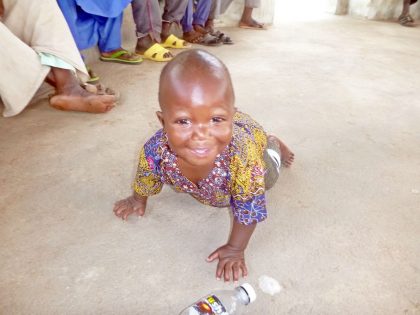 issue) will be disposed of in a rapid and efficient manner, significantly reducing exposure.
issue) will be disposed of in a rapid and efficient manner, significantly reducing exposure.
The Regional Director of the Department of Hydraulics stated in his technical report the Wassarabo health clinic borehole well water system has fully succeeded in meeting both the local and national objectives for potable water. The Department of Hydraulics, the Ministry of Health and staff at each rural health clinic served by this project have repeatedly been astounded at the expediency with which funding was made available thus allowing work to begin within weeks of submitting the project request. Thank you, donors and Water Charity! The efficiency of work that followed was due in large part to the incredible efficiency, planning, and hard work by the local drilling company’s crew. The Regional Director and the hydrogeologist at the Department of Hydraulics and Water in Sokodé also contributed their time, vehicle and expertise to insure all technical aspects of the project conformed to modern standards and have assured their continued presence as the borehole wells are now part of the national water database and monitoring program. Having the government of Togo involved from the beginning in this suite of health clinic projects, from the selection of health centers to technical oversight and continued monitoring by the Ministry of Water officials, has confirmed the importance of not doing community projects as isolated NGOs. This last point is critical to continued success as most water projects in Togo are implemented without government oversight, leading to a myriad of problems none the least being poor technical implementation and little to no continued oversight.
The Wassarabo project was implemented in concert with five other health center water system projects, scattered over two districts – all of which were completed on schedule. The community of Wassarabo offers its sincere thanks and gratitude to the donor(s) for this valuable water resource. As they say here “l’eau est la vie”. Water is life, and the cleaner the water the longer and more satisfying life will be! Un grand merci!